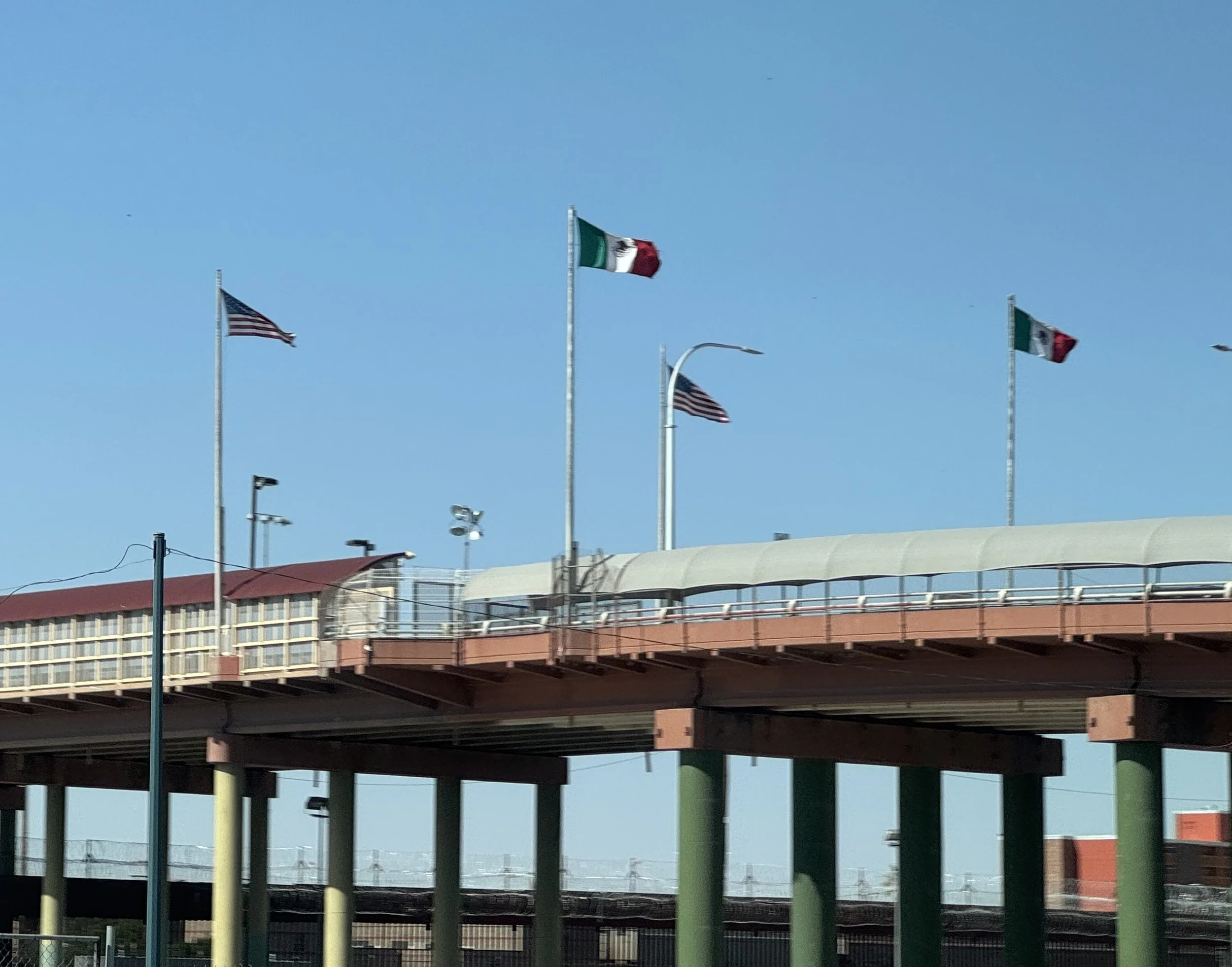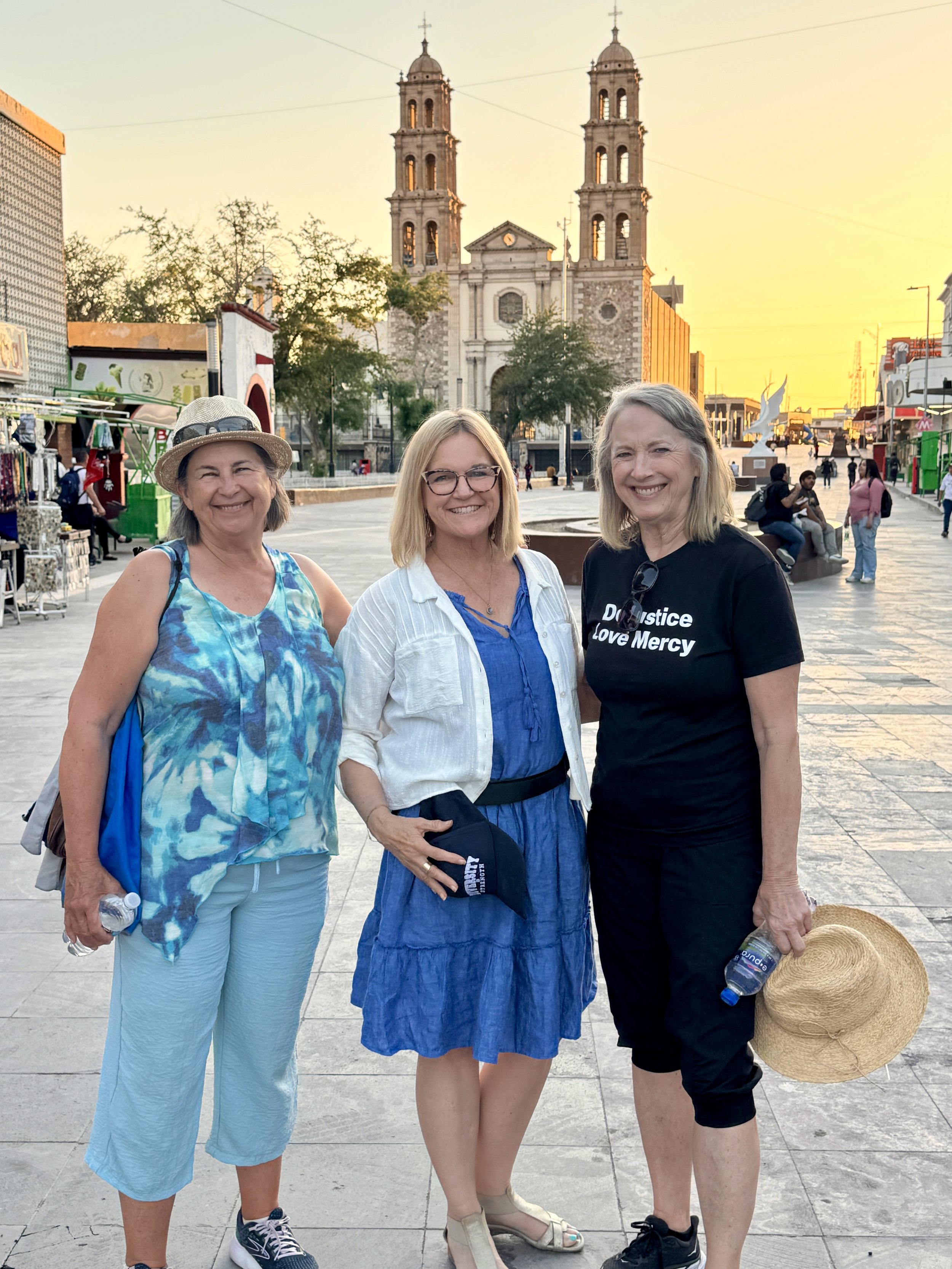Journey to the Border
Three Flourish Friends’ Transformative Experience
Three Flourish friends, Emily, Laura and Jan traveled to El Paso to learn about immigration beyond the headline and sound bites. What they discovered changed their understanding of humanity, faith, and their calling to bridge divides through truth and compassion.
They traveled with Abara, whose work fosters connection, healing, and action at the U.S.-Mexico border. The organization creates spaces where stories are honored, divisions are bridged, and people are equipped to pursue peace and justice across borders. Abara's mission is rooted in contemplative Christian traditions that welcome the stranger, care for the vulnerable, and foster reconciliation. The program invites faith-based participants to explore the theology of migration, a framework that shaped the group's experience as reflected in Jan's observations below.
Setting Out for Truth
As Emily sat in the Hacienda — home of Abara — just feet from the border wall—she began with this profound question: "Fear over immigration divides us." When you continually hear our country is running rampant with immigrant 'murderers, rapists, drug dealers, mentally insane, gang members and released prisoners,' fear spreads. But what is the truth?
A Posture of Learning
Jan reflected, "Our first day was spent on spiritual formation. We were asked faith based questions on how we looked at others - for example: 'Where did you bear witness to the Imago Dei being violated in humanity? What is your faithful response?' We looked at our emotions and feelings - grief, fear, anger, shame and guilt and how these are interrelated to our responses to injustice."
Laura observed, "As we arrived at the hacienda that houses the Abara ministry, we were surprised to see its proximity to the border fence. It is literally 'on the border!' The location is very strategic- it is one of the oldest known crossings of the Rio Grande River since Spanish colonization in 1598."
Each day brought new learning from experts about immigration law and the people migrating to find safety for their families. Emily learned that "around the world, one in sixty-nine people today are forcibly displaced" due to war, violence, persecution, economic decline, and gang threats. "49% are women and girls. 40% are children. These are people looking for safety and security, consistent work; their next meal."
Faces Behind the Statistics
Laura shared a powerful encounter: "Nica, also on staff at Abara and herself a Colombian immigrant to the U.S. took us on a silent walk along the fence, telling story after story of the people seeking to come to the U.S."
One story particularly moved them—about a desperate mother from southern Mexico whose area had run out of water. Laura recounted, "When she got to the Rio Grande, she walked to the middle and urged her 13 year-old to take her ten and four year-old across. When the four year-old turned and asked his mama if she was coming, she told him she could not. She had not heard from them since that day. I reflected on the level of desperation of a mother who would sacrifice being with her children for the hope of their survival."
Dispelling the Myths
Jan reflected on what they learned: "These refugees are not rapists and mentally ill. They are families escaping from untenable situations at home. Violence, complete lack of resources as basic as water, and their children being forced into gangs."
Emily discovered important facts: "Statistics have shown that when immigration was the highest in 2016 violent crime was at its lowest. As far as drug dealers go, US citizens were 80 percent of individuals with fentanyl seized at ports from 2019-2024. Perhaps the Criminal Migrant is a myth."
She also learned that "most immigrants who are deemed 'illegal' have let their visas or or TPS (temporary protected status) lapse. A better term for them is undocumented. Many immigrant workers pay taxes and social security but cannot benefit from them."
What is Our Call to Action?
Laura shares, "I am reminded of Leviticus 19:23,24 'When a foreigner resides among you in your land, do not mistreat them. The foreigner residing among you must be treated as your native- born. Love them as yourself, for you were foreigners in Egypt.'"
Emily offered practical steps to dispel fear:
Do our homework and get the actual facts
Listen to stories of immigrants in your area
Be vocal to your elected officials about wanting clear paths to citizenship
Dispel harmful narratives in your circle
As Emily concluded, "Immigrants have the same desires as us and ought to be treated humanely, with understanding and dignity and given a clear direction for their future. With knowledge, we can dissipate fear as we work together to bridge the divide."
Jan’s final thought is what we all need in this time in our country,"Linking arms together. It's how we are going to change our world into a place where all can flourish."
How does Emily, Laura and Jan’s experience connect with you and your views of our current immigration?















